Iranian MP says he would not hesitate to kill Trump

An Iranian lawmaker said he would kill Donald Trump after the US president threatened to obliterate Iran if it sought to assassinate him.

An Iranian lawmaker said he would kill Donald Trump after the US president threatened to obliterate Iran if it sought to assassinate him.
"For my part, I would say that whenever I get the opportunity, I will not hesitate for a moment to kill you, Donald Trump," said Mojtaba Zarei, a member of the Iranian Parliament's Foreign Policy Commission.
"And I am a political official speaking this diplomatically," he said in a post on Iranian social media platform Eitaa.
While signing a sanctions directive on Tuesday to increase pressure on Tehran, Trump was asked about the potential fallout for Iran if it made an attempt on his life.
US law enforcement last year accused Iran's Islamic Revolutionary Guard Corps, a powerful paramilitary organization, of organizing a plot to kill Trump in retaliation for his order to assassinate its foreign operations chief Qassem Soleimani in 2020.
"If they did that, they would be obliterated," Trump said.
"That would be the end. I've left instructions - if they do it, they get obliterated. There won't be anything left."
Iranian foreign ministry spokesperson Esmail Baghaei reacted to the remarks on Wednesday, saying, “Tehran reserves its right to pursue a legal process for achieving justice regarding the killing of national champions and senior officials to achieve results in domestic and international courts.”
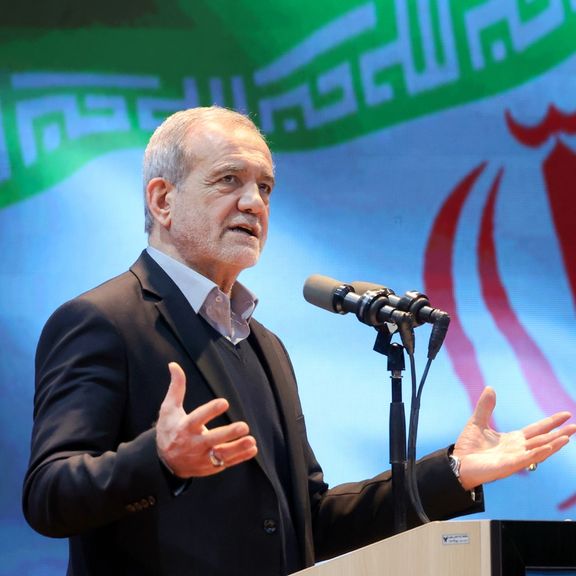
Iran's president on Wednesday played down a memorandum signed by US President Donald Trump aimed at reducing Tehran's oil exports to zero but offered no reaction after Trump said he was willing to speak with his Iranian counterpart.
"The US says it is sanctioning Iran, but if we manage our resources well and maintain good relations with our neighbors, how can a country with such capacity and longstanding ties with its neighbors be easily sanctioned?" President Masoud Pezeshkian said in an event held at the country's energy ministry.
His comments came one day after the US president restored his so-called maximum pressure policy on Iran with a presidential memorandum signed ahead of his meeting with Israeli Prime Minister Benjamin Netanyahu in Washington DC.
In Trump's first term in office, Iran's oil exports were reduced to near zero after he re-imposed the sanctions that had been lifted under a 2015 nuclear deal between Tehran and world powers. Under former US President Joe Biden, however, Iran's oil exports increased starting in 2021 as Tehran found ways to circumvent the curbs.
"They think everything we have depends on oil and want to block our oil exports, while there are many ways to neutralize their objectives," Pezeshkian said Wednesday.
However, he did not address Trump's mooted openness to engage in conversations with his Iranian counterpart after signing the directive.
"I would reach out (to Iranians). I'm the one that doesn't care whether I reach out or they reach out. A lot of people say let them reach out," Trump told reporters on Tuesday. "To me it doesn't matter. It's just talks. I want to see peace in the Middle East and elsewhere."
Iran's First Vice President Mohammad Reza Aref said that although a meeting between "two human beings" is not impossible, engaging in talks with Trump is not currently on the Islamic Republic's agenda.
The Iranian government spokeswoman also reacted to Trump's remarks regarding his readiness to negotiate with the Iranian president.
"Our country's foreign policy has always been based on a set of fixed principles. We follow three key principles: the dignity of the country and its people, wisdom in understanding underlying issues, and expediency," Fatemeh Mohajerani said.
"All national matters, particularly relations with other countries, are pursued based on these principles."
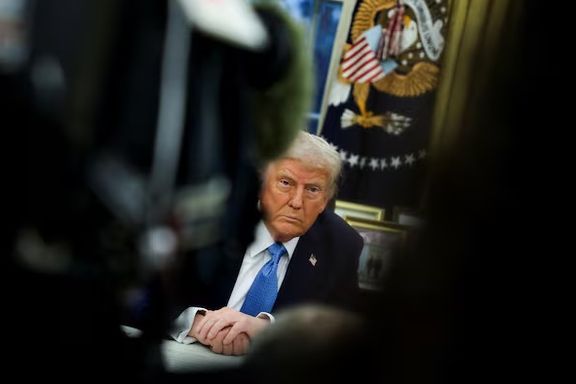
US President Donald Trump said on Wednesday that any reports the United States and Israel would work together on a devastating military attack on Iran were overblown.
"I want Iran to be a great and successful Country, but one that cannot have a Nuclear Weapon. Reports that the United States, working in conjunction with Israel, is going to blow Iran into smithereens,” ARE GREATLY EXAGGERATED," Trump said.
Iran has denied seeking a nuclear weapon, but Israel has long contended Tehran wants a bomb and that its arch-enemy poses an existential threat.
Long opposed to foreign wars, Trump has nevertheless adopted a hard line on Iran, saying that Iran cannot be allowed to have a nuclear weapon but also maintaining that Washington should not pursue regime change.
"I would much prefer a Verified Nuclear Peace Agreement, which will let Iran peacefully grow and prosper. We should start working on it immediately, and have a big Middle East Celebration when it is signed and completed. God Bless the Middle East!" he added in the post on his Truth Social platform.
In the White House Oval Office on Tuesday, Trump signed a directive reviving the maximum pressure policy on Iran from his first term aimed at driving the Islamic Republic's oil exports to zero, adding he was reluctant and preferred to make a deal.
Trump said last month that he hoped a deal over Iran's nuclear program would make it so that the United States did not have to support an Israeli attack on Iran.
Asked by a reporter in the Oval Office whether he would support Israel striking Iran's nuclear facilities, Trump said: "Obviously, I'm not going to answer that question."
"It would really be nice if that could be worked out without having to go that further step ... Iran hopefully will make a deal, and if they don't make a deal, I guess that's okay too."
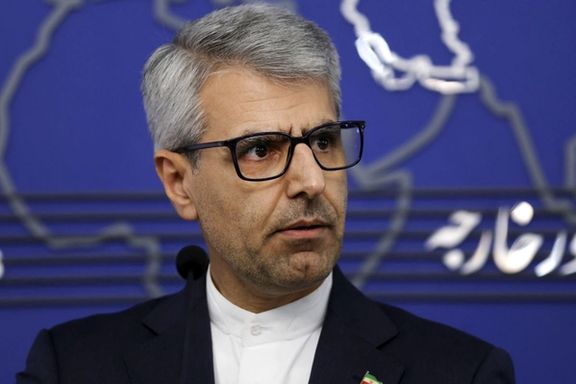
Tehran dismissed US President Donald Trump’s warning that any attempt by Iran to assassinate him would result in the country’s destruction, calling the remarks "provocative".
While signing a sanctions directive on Tuesday to increase pressure on Tehran, Trump was asked about a reported plot by the IRGC, Iran's powerful military and intelligence force, to assassinate him in retaliation for the killing of General Qasem Soleimani.
"If they did that, they would be obliterated. That would be the end. I've left instructions if they do it, they get obliterated. There won't be anything left," the US President said in response.
Iranian foreign ministry spokesperson Esmail Baghaei responded to the statement on Wednesday, saying that, “Tehran reserves its right to pursue a legal process for achieving justice regarding the killing of national champions and senior officials to achieve results in domestic and international courts.”
During his first term, in 2020, Trump ordered the killing of Soleimani in Iraq. Soleimani led the Islamic Revolutionary Guard Corps’ Quds Force and Iran's influence and proxy efforts in the Middle East.
Since then, US authorities have tracked several threats against Trump and former officials linked to Soleimani's assassination.
A threat to Trump’s life from Iran led to heightened security ahead of a July campaign rally in Pennsylvania, where Trump was shot in the ear, according to US officials. At the time, officials stated they did not believe Iran was involved in the assassination attempt. In November 2024, the US Justice Department revealed that an Iranian plot to kill Trump before the presidential election had been thwarted.
“Iran did not plot President-elect Donald Trump’s assassination,” President Masoud Pezeshkian told NBC last month, adding, “All the assassinations and acts of terror we see happening in Europe and elsewhere, can we see the footsteps of Iranian nationals or other nationals?”
Before the President's denial, Supreme Leader Ali Khamenei's official account on X shared an image of Trump under the shadow of a drone in 2021. The Farsi tweet, which included the word "vengeance" in red, read: "Soleimani's murderer and he who ordered it will have to pay." The post was later deleted.
The following year, the Supreme Leader's website published an animation showing IRGC forces killing Trump on a golf course.
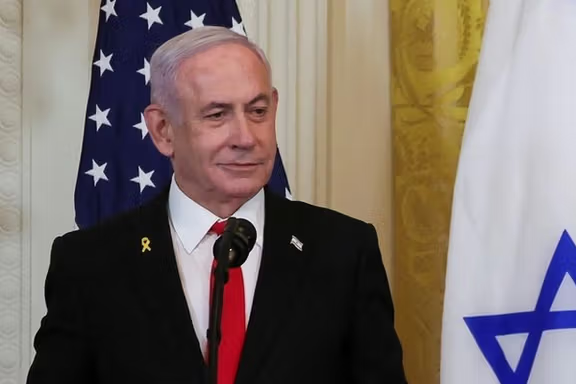
Israeli Prime Minister Benjamin Netanyahu told US President Donald Trump at a White House Press conference on Tuesday that the two leaders agree on the danger posed by Iran after the Islamic Republic tried to kill them both.
The Israeli premier praised Trump for pulling out of a deal on Iran's nuclear program, helping midwife a Gaza ceasefire deal freeing some Israeli hostages and restoring on Tuesday the so-called maximum pressure policy of sanctions on Iran from his first term.
"We see eye to eye on Iran. That's the same Iran that tried to kill us both. They tried to kill you, Mr. President, they tried, through their proxies, to kill me."
Iran-backed Hezbollah fighters launched a drone attack from Lebanon on Netanyahu's vacant seaside residence at the height of its conflict with Israel last year. US law enforcement accused Iran of seeking Trump's assassination as retaliation for his order to kill top Iranian commander Qassem Soleimani in 2020.
"The roar of the Lion of Judah is heard loudly throughout the Middle East," Netanyahu said. "Israel has never been stronger and the Iran terror axis has never been weaker."
An attack by Iran-backed Hamas militants on Israel from Gaza on Oct. 7, 2023 triggered a multi-front confrontation embroiling the Jewish state, Iran and the armed groups the Islamic Republic supports in the Middle East.
Over the course of the 15-month war which is now paused by the ceasefire, Israel throttled Hamas in Gaza, decapitated Hezbollah's leadership and helped bring about the downfall of the Assad dynasty in Syria, Iran's oldest Arab ally.
A direct attack on Iran on Oct. 26, 2024 knocked out much of its air defenses and left the Houthi group in Yemen its last largely undeterred affiliate in the region.
"We've devastated Hamas, we decimated Hezbollah, we destroyed Assad's remaining armaments and we crippled Iran's air defenses," Netanyahu added. "We've defeated some of America's worst enemies."
The Israeli premier cited the Americans among the over 1,200 Israelis killed by Hamas in its Oct. 7 attack and among the scores taken captive in Gaza.
"We're both committed to rolling back Iran's aggression in the region and ensuring that Iran never develops a nuclear weapon," Netanyahu continued.
"Mr. President, ladies and gentlemen, Israel will end the war by winning the war. Israel's victory will be America's victory. We will not only win the war working together, we will win the peace."
Trump has repeatedly vowed to not allow Iran to possess a nuclear weapon and said he much prefers a diplomatic solution.
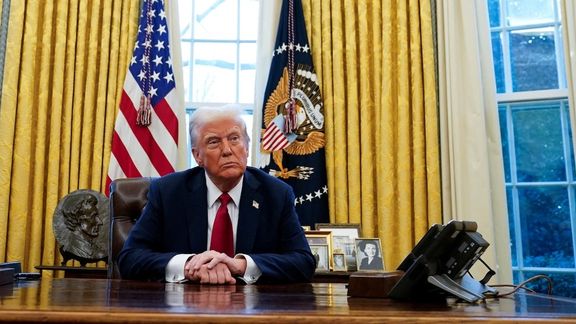
US President Donald Trump on Tuesday signed a directive restoring the so-called maximum pressure policy on Iran of his first term and warned of "catastrophic" consequences if Tehran does not make a deal on its nuclear program.
Trump said he hoped for an agreement denying Iran nuclear weapons "so that it doesn't end up in a very catastrophic situation," but sounded a dovish note by saying he was prepared to speak with his Iranian counterpart.
"I really want to see peace, and I hope that we're able to do that. They cannot have a nuclear weapon," he told reporters at a press conference alongside Israeli Prime Minister Benjamin Netanyahu in the White House.
"It's very simple. I'm not putting restrictions. They cannot have one thing. They cannot have a nuclear weapon," Trump said.
Iran has denied seeking a nuclear weapon, but Israel has long contended Tehran wants a bomb and that its arch-enemy poses an existential threat.
In withdrawing the United States from a 2015 international nuclear deal in his first term, the Trump administration cited not only its alleged inability to curb Iran's quest for a bomb but also the deal's failure to address Iran's missile program or support for armed allies in the region.
Trump added that if he believed Iran was going to possess a nuclear bomb, that would be "very unfortunate" for Tehran.
"If, on the other hand, they can convince us that they won't, and I hope they can ... it's actually very easy to do, I think they're going to have an unbelievable future."
Iran Directive
Trump earlier in the day signed a directive reviving the maximum pressure policy aimed at driving the Islamic Republic's oil exports to zero.
"This is one that I'm torn about," Trump told reporters in the Oval Office. "Everybody wants me sign it. I'll do that. It's very tough on Iran," he said.
Asked if he would engage in conversations with his Iranian counterpart, Trump responded, "I would." It was not clear whom he meant.
Iran was "too close" to being able to acquire a bomb, Trump added, saying the US has the right to block Iran's oil sales to other nations and threatened Iran with "total obliteration" should they seek to kill him in retaliation.
US law enforcement last year accused Iran of seeking Trump's assassination as retaliation for his order to kill top Iranian commander Qassem Soleimani in 2020.
Trump said he hoped he would not have to follow through on the memorandum.
"Hopefully we're not going to have to use it very much. We will see whether or not we can arrange or work out a deal with Iran and everybody can live together."
Speaking before his White House meeting with Netanyahu, Trump said his predecessor Joe Biden allowed Iran to grow stronger and richer.
"They're not weak. They're very strong right now," he said.
Netanyahu praised Trump for the renewed pressure on Iran, his original decision to pull out of the nuclear deal and helping midwife a Gaza ceasefire deal freeing some Israeli hostages.
Israeli military blows over the course of a 15-month war with Iran and its armed allies, he told the news conference, had weakened the Islamic Republic.
"Israel has never been stronger and the Iran terror axis has never been weaker," he said.
'Malign influence,' snapback
The directive instructs the US Treasury to enforce sanctions and compliance measures against entities that breach current restrictions, Reuters reported earlier on Tuesday citing a US official.
Trump's policy on Iran will be aimed at denying Washington's Mideast nemesis all paths to a nuclear weapon and countering Iran's "malign influence," the official was quoted as saying.
Secretary of State Marco Rubio will also adjust or retract sanctions waivers, working with the Treasury to reduce Iranian oil exports to zero, the official added.
The US ambassador to the United Nations will work with allies to "complete the snapback of international sanctions and restrictions on Iran," the official said.
Snapback refers to the restoration of UN sanctions on Iran which were lifted by a 2015 international deal over Iran's nuclear program, which would likely need to be activated by European parties to the agreement after the US withdrew in 2018.
Trump's maximum pressure approach in his first term beginning in 2018 pummeled Iran's economy, causing a dramatic decline in oil exports and skyrocketing inflation.
In response, Tehran began to taper its adherence to the nuclear deal and ramped up military involvement in the region. During his first term, Trump also ordered the assassination of top Iranian commander Qassem Soleimani in a drone strike in 2020, depriving Iran of its wiliest military operator in the region.
Israeli Prime Minister Benjamin Netanyahu is due to meet Trump in Washington on Tuesday, and their strategy on Iran and its nuclear program is due to loom large.
Over 15 months of punishing military blows by Israel against Iran and its armed Mideast allies has weakened the so-called Axis of Resistance Tehran leads.
Trump said last month that he hoped a deal over Iran's nuclear program would mean the United States did not have to support an Israeli attack on Iran.
Long opposed to foreign wars, Trump has nevertheless adopted a hard line on Iran, saying that Iran cannot be allowed to have a nuclear weapon but also maintaining that Washington should not pursue regime change.